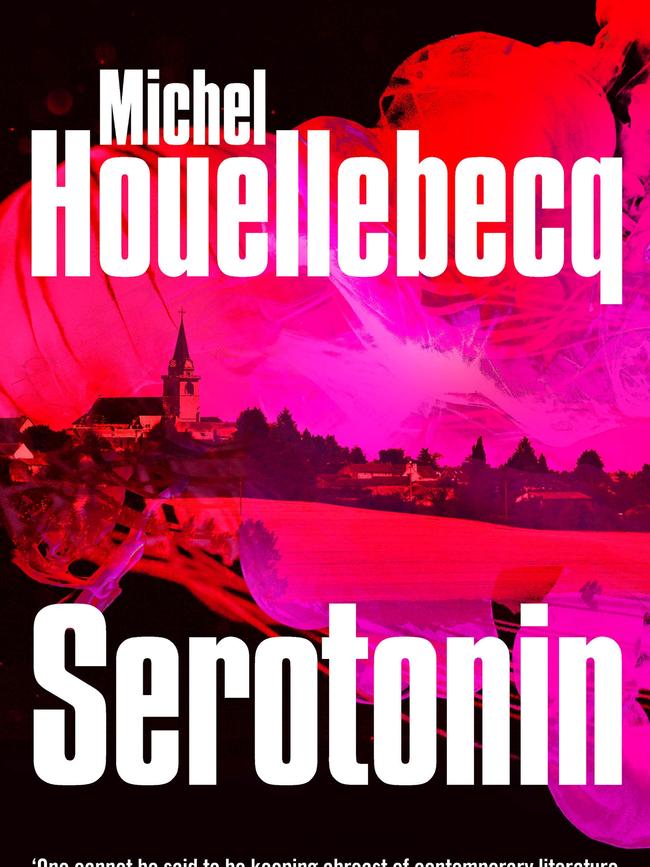Halcyon daze
They say old age is not for sissies. But middle age as depicted by French provocateur Michel Houellebecq brings its own pallete of regret.

‘Towards the end of your life,” thinks Kenneth Trachtenberg, narrator of Saul Bellow’s 1987 novel, More Die of Heartbreak, “you have something like a pain schedule to fill out.” This sounds bureaucratic but turns out to be existential.
First come the physical indignities, suggests Trachtenberg, then the professional failures and personal defects. Injuries, betrayals and injustices from the past return with full force. “But,” he concludes, “the hardest items of all have to do with love. So why does everybody persist?”
Michel Houellebecq’s new novel (ably translated by Shaun Whiteside), his eighth in just over two decades, is a pain schedule in narrative form. It notates the flaws and disappointments of one man before expanding outwards to encompass the erosion of old ideas of nation and culture. Most of all, it asks the same question about the persistence of love, though in a manner more raw and less comfortably loquacious than Bellow.
This is not to suggest that Houellebecq has gone soft. The figure who has generated more outrage and inspired more debate than any other francophone writer of his generation retains his predilection for shock.
Serotonin contains explicit if thankfully brief descriptions of bestiality and pedophilia, flirts with the idea of armed resistance to the state, and while the attitudes towards women held by its narrator are at points less overtly misogynistic than in the past, they remain adamantly un-woke. As Patrick White said of Japanese author Yukio Mishima, reading Houellebecq can feel like bathing in someone else’s dirty bathwater.
Yet these passages turn out to be feints; the real atrocity lies elsewhere. Houellebecq’s narrators usually take jaundiced pleasure in their awareness of civilisational decline and societal collapse, or at least offer an insouciant shrug. Not this time. Serotonin is a novel written under heavy medication — a cri de coeur swaddled in antidepressants and cotton wool.

This listless affect emerges from the personality and situation of the book’s narrator. When we first meet Florent-Claude Labrouste, he is marooned in middle age. At 46, the former ag college student turned mid-level bureaucrat at the French ministry for agriculture feels that both life and love are over.
Florent’s younger Japanese girlfriend has adopted a position of sullen enmity towards him, while his career has corresponded with an era in which free market orthodoxy has hardened into pure ideology. The effect has been the gradual erosion of traditional French farming, with centuries of craft and custom undercut by multinational fiat, genetically modified imports and self-defeating EU directives.
Florent resolves his situation by staging a disappearance. He abandons the lease on his Paris flat, resigns from his job and moves into an anonymous hotel across town. There he sprawls in front of TV cooking shows, joylessly chain-smoking and boozing, “a middle-aged Western man … with no relatives or friends, stripped of personal plans or personal interests, deeply disappointed by his previous professional life, whose emotional experiences had been variable but had the common feature of coming to an end, essentially deprived of reasons to live and reasons to die”.
He builds a personal hell, in other words, designed to his own taste. Yet when even this limited existence palls, the only thing that muffles the sadness he feels in his recently won solitude is a drug. Captorix, newly released on the market and already hugely popular, increases serotonin levels enough to induce a feeling of resigned neutrality, even in the chronically depressed.
Stabilised to some extent, Florent heads for the country: to Normandy, home of the closest thing he has to an old friend — Aymeric, scion of an old aristocratic family — and the place where, during an earlier time, he was briefly happy in love.
Houellebecq’s purpose here is to twin nostalgias. Aymeric’s people went to England with William the Conqueror. They have reliably furnished France with generals and bishops and ministers in the centuries since. Yet the eldest and only son of the next generation has only presided over the sale of estate land and the fraying of its agricultural fortunes.
Meanwhile Florent, holed up in a holiday cabin on Aymeric’s property, stalks a former girlfriend living nearby whom he has belatedly realised was the love of his life. As the son of boomer parents who chose suicide rather than life apart when one partner was diagnosed with cancer, Florent has failed, on a personal level, to live up to older romantic ideals.
What is interesting in these pages is how little interest the author appears to take in his own creation. Perhaps Houellebecq hopes to replicate something of the torpor Captorix induces in the many who take it. Certainly, Florent’s meandering disquisitions on the relative merits of mid-level hotel chains or bistro menus of Normandy’s market towns suggest a mind distracted and dishevelled.
Yet the same carelessness is brought to bear on the novel’s political strand. Aymeric and his rural peers have reached the point where every proud and storied aspect of Normandy’s agricultural existence has been hollowed out. The same famous cheeses are marketed to the world, but the milk used to make them is bought by a multinational, which has depressed prices to the point of driving the region’s dairies out of business.
The bucolic French countryside has, in Houellebecq’s telling, become eerie: the ghostly remnant of a once-vibrant region. And those farmers who remain there are subject to maladies — alcoholism, depression, suicide — which speak of a society under extreme stress.
Fascinating as it is to watch Houellebecq expand his typically urban anomie into rural France (with the implication that neoliberalism has transformed the country into mere green-leaved nodes of the globalised economy), the drama he wrestles from it falls flat. Because it is Florent’s eyes we see through, and because Florent is sympathetic yet finally indifferent towards Aymeric and his cohort, his vision is inevitably touristic, casual.
What becomes clear is that Florent’s primary obsession is love and its loss. There is Yuzu, of course, abandoned early on in the novel; and prior to her a string of more or less unviable medium-term relationships. None of these approaches the emotional intensity of his time with a young woman named Camille.
It was Camille who lived with Florent in Normandy years before, a period of peace and sexual bliss that ended with a return to Paris and a breakdown in the relationship. Much of the latter sections of the novel are given over to Florent’s futile efforts to revive something of the vigour and possibility inspired by that affair.
But it is at this point that Serotonin slips into disequilibrium. Houellebecq would have readers believe that Florent is sincere in his sorrow — that sadness is, chemically as well as emotionally, consuming him from within. The author would cadge goodwill on his narrator’s behalf.
The problem is that, like so many of the author’s stand-ins, Florent has spent much of the novel espousing a kind of libidinal nihilism. His account of relations between the sexes is, ultimately, inconsonant with the kind of profound connection the narrator claims for his relationship with Camille.
Houellebecq reduces all heterosexual interactions to a set of power relations emerging from radically opposing ways of being. There is no space for tenderness in such encounters: merely mutually agreed exploitation.
The author blames outside forces for this state of affairs. Paris as a city, for example, is viewed as ground zero for atomised selfhood — it is a place “made to generate loneliness”. It follows from this that society in general is a machine “for destroying love”.
And as the forces of globalisation unfurl their tentacles from the urban centre right out to the rustic peripheries of France and Europe as a whole, this social catastrophe corresponds to the economic and cultural upheaval that Aymeric’s half of the narrative describes.
Houellebecq wants it both ways in Serotonin. He wants us to retain care for a man who has spent a life refusing the kinds of reciprocity on which any meaningful community or relationship is necessarily based. And he urges us to mourn the loss of an organic society, like that one embodied by the aristocratic Aymeric and his fellow farmers, after having spent a career dismantling the premises on which such societies are founded.
That said, in drawing up the sad balance sheet of his failed existence, Florent does make one large, unanswerable point. Any population sufficiently medicated no longer has clear purchase on unmedicated reality. Captorix and its real-world equivalents have robbed us of that equipment necessary to maintain authentic relations with the world. It doesn’t create or transform; it interprets. It renders fleeting what was definitive; it renders contingent what was ineluctable. It supplies a new interpretation of life — less rich, less artificial, and marked by a certain rigidity. It provides no form of happiness, or even of real relief; its action is of a different kind: by transforming your life into a series of formalities it allows you to fool yourself. On this basis, it helps people to live, or at least not to die — for a certain period of time.
Viewed though this lens, Florent’s confused, wounded semi-existence does not seem so muddled and appallingly unemphatic, just a side effect. Nor is Serotonin’s lack of narrative focus an aesthetic failure, in this case. It could be read as a triumph of contemporary realism.
Geordie Williamson is The Australian’s chief literary critic.
Serotonin
By Michel Houellebecq. William Heinemann, 320pp, $32.99




To join the conversation, please log in. Don't have an account? Register
Join the conversation, you are commenting as Logout